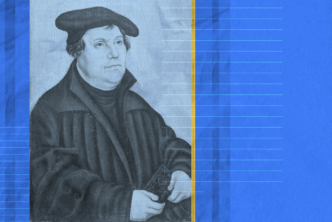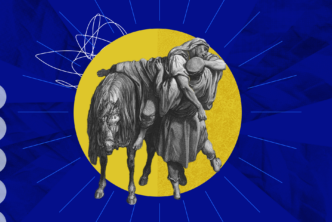Word order can often be significant, especially when it is surprising. For example, Paul’s letter to the Christian believers in Rome is the flagship of the Pauline fleet. The apostle greatly treasured his special calling to be an apostle that came through the direct appearance of the resurrected Christ to him outside the city of Damascus.
So we might have expected Paul to introduce himself right at the beginning of Romans as someone “called to be an apostle of Christ Jesus.” But no! His chosen self-description is this: “Paul, a slave (doulos) of Christ Jesus, called to be an apostle” (Rom 1:1). Similarly, Peter begins his second letter, “Simon Peter, a slave (doulos) and apostle of Jesus Christ” (2 Pet 1:1), and not “an apostle and slave of Jesus Christ.”
Doulos is the distinctive Greek word for “slave.” It is unfortunately true that many modern English versions avoid translating doulos with “slave” and opt for the less-specific term “servant.” There are, in fact, some six NT Greek words that can be rendered “servant,” but there is only one special word for “slave.” From their preference for it, then, is it not fair to infer that these two towering figures in the early church both believed that it was a higher calling to be Christ’s slave than even to be his apostle?
A similar inference may be drawn from the initial self-description of two of Jesus’s half-brothers (see Mark 6:3), who each understandably might have been tempted to call himself “the brother of Jesus.” But Jude describes himself as “a slave (doulos) of Jesus Christ and a brother of James” (Jude 1), while James begins his letter, “James, a slave (doulos) of God and of the Lord Jesus Christ” (Jas 1:1). Did Jude and James not believe that it was a more exalted privilege to be the slave of Christ than even to be his brother?
But what is a slave (doulos)? A slave is someone whose person and service belong wholly to another. In the case of Paul, Peter, Jude, and James—and all Christians—the Another is the Lord Christ who paid the supreme price to redeem us, with the result that we are not our own masters (1 Cor 6:19–20).
As Christ’s purchased possession, the believer is the exclusive property of the Master. “Whether we live or die, we belong to the Lord” (Rom 14:8). And since this Master is himself the Lord of the universe (Acts 10:36), slavery to him is a consummate privilege and joy, not debilitating drudgery.
As the apostle John describes the final state of believers in the city of God, the site of the throne of God and of the Lamb, he observes that the slaves (douloi) of the Lord God will perpetually serve him in worship and see his face (Rev 22:3–4).
***
From Murray J. Harris, Navigating Tough Texts: A Guide to Problem Passages in the New Testament (Lexham Press, 2020).
This article was originally published in the May/June 2022 issue of Bible Study Magazine. Slight adjustments, such as title and subheadings, may be the addition of an editor.
Related articles
Related resources
Navigating Tough Texts: A Guide to Problem Passages in the New Testament
Regular price: $16.99
Slave of Christ: A New Testament Metaphor for Total Devotion to Christ (New Studies in Biblical Theology, vol. 8 | NSBT)
Regular price: $19.99






